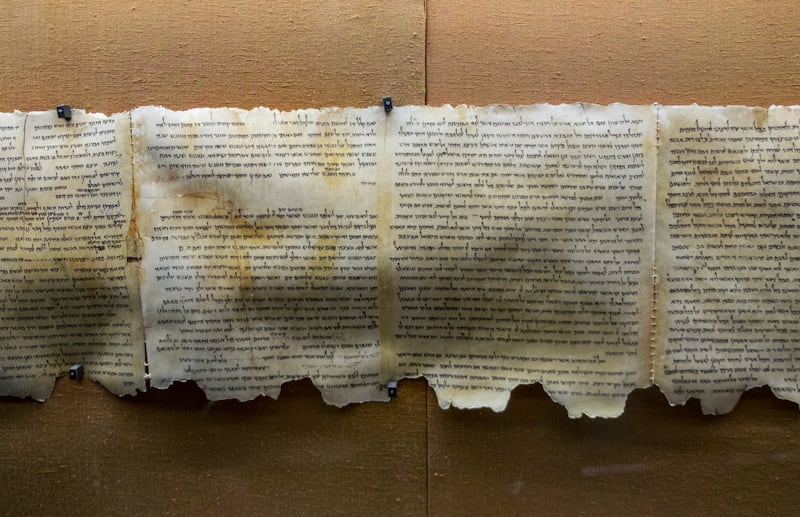Among the documents known as the Dead Sea Scrolls are full or partial manuscripts of the Hebrew Bible, the Old Testament. But many other texts represent what has come to be called “sectarian literature.” That is, they seem to have been written and treasured specifically by the group that occupied the Qumran settlement, near the caves where the scrolls were found.
Scholars generally recognize that the characteristic features of the sectarian texts from Qumran, the aspects that distinguish them from other Jewish documents of the period (roughly 250 B.C. to A.D. 70), are (1) a belief in cosmic dualism, (2) a firm insistence on individual predestination, and (3) a unique identification of evil with the concept of impurity.
Dualism is the first and most striking belief found in the sectarian scrolls. The Qumran movement divides the entire universe into two warring parties. One, led by “the prince of light” (Michael or Melchizedek), is an army of angels and men called “the sons of light.” Against them are arrayed “the sons of darkness,” the evil angels and wicked men led by Belial (or Melki-resha‘). Eternally divided by mutual hostility, they can never be reconciled.

Still, the contest is not an equal one. For God himself prefers the sons of light. Whereas Belial and Michael are roughly on a par, God’s power far exceeds theirs and, in the end, will prove decisive. Furthermore, Belial, the evil angel, is dependent upon God, who designed him to be what he is. He simply obeys the commands of his maker. “And (God) created Belial for the pit, angel of hatred,” says one document. “His dominion is darkness; his counsel is for evil and wickedness.” Thus, God is finally responsible not only for all the good in the universe, but for the entirety of cosmic evil. At the last, though, evil will be overthrown and will vanish. This too, is part of God’s decree.
Everything, every detail, is under God’s control. (Predestination is the second identifying trait of Qumran sectarianism.) This emphasis on God’s sovereign power, while it undoubtedly comforted and reassured those who saw themselves as his chosen elect, completely obliterates human freedom. Every human act, has, on this view, been preordained by God. The mixture of good and evil in men’s natures is predetermined by their creator. Nothing can change it, and the elect cannot be lost. (At most, humans are free to discover what, by divine decree, they already are.)
“You, you alone,” declares a text from Qumran, addressing God, “have created the just man. ... But the wicked you have created for the time of wrath, from the womb you have predestined them for the day of annihilation.” If humans are saved, it is, yes, because they are righteous. But their righteousness originates from God’s irresistible will, not from themselves.
Finally, the sectarian documents from Qumran equate impurity with evil. And, since impurity thoroughly permeates this world, all people are necessarily impure and, thus, inescapably evil. Man is “a creature of clay ... (who) is in sin from his maternal womb, and in guilty iniquity right to old age.” “I am a creature of clay, fashioned with water, foundation of shame, source of impurity, oven of iniquity, building of sin, spirit of mistake, astray, without knowledge, terrified of (God’s) just judgments.”
To be saved, therefore, one must be purified, and this can only occur through atonement and God’s merciful forgiveness. The ultimate difference between the righteous and the unrighteous is that the righteous are graciously granted purification and atonement for their sins while the unrighteous, chosen from before creation to suffer this fate, are not. Those predestined to damnation remain forever outside of God’s mercy.
In the end, only those affiliated with the community at Qumran have any hope of salvation. “You have chosen a people in the period of your favor. ... You established them, isolating them for yourself in order to make them holy among all the peoples.” “I thank you, Lord, because you saved my life from the pit.”
Beyond the Dead Sea community, in the dominion of Belial, salvation is impossible. Whoever is not a member of the community “will not become clean by acts of atonement, nor shall he be purified by cleansing waters, nor shall he be made holy by seas or rivers, nor shall he be purified by all the waters of ablutions. Defiled, defiled shall he be.”
Daniel Peterson teaches Arabic studies, founded BYU’s Middle Eastern Texts Initiative, directs MormonScholarsTestify.org, chairs mormoninterpreter.com, blogs daily at patheos.com/blogs/danpeterson, and speaks only for himself.


